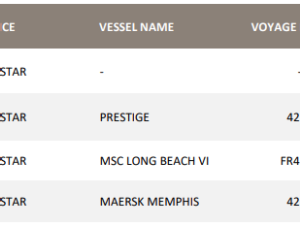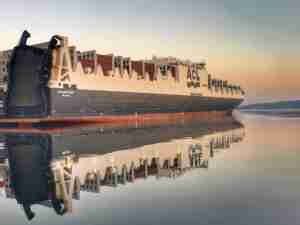'With marine gas oil alone rising from $650 to $800 per ton in the last three months, the ripple impact of fuel costs on maritime transport is obvious,' Ruediger told his audience. 'Less visible are the ways today's tight vessel market are also impacting costs and customer service.
'First, there is a mounting shortage of suitably sized tonnage available to handle today's strong project cargo demand. A 3,000-6,000 deadweight 'tween-decker' with a pair of 40-ton cranes now commands a minimum of $10,000 per day. An 8,000 tonner with 150-ton cranes is going for $25,000. These kinds of vessels are ideally configured for project cargo moves in the Central and South American trade, but are becoming harder and harder to contract. Many have moved to Asia and the oilfields of the Persian Gulf and Africa. One Indian manufacturer now has about 10% of the global fleet in this size range devoted just to transporting its wind generation products. Owners are in tight control, and the situation is not likely to get better quickly.
'Investment in new project cargo vessels is shifting to larger and more specialized tonnage, and owners are steadily cutting out the old brokerage system through which we used to charter these services. In some cases we estimate, today's charter rates represent a 50% markup over actual costs.' At the same time, he added, the quality of many services has declined.'
'The devil is really in the details in today's charter contracts. In the past, language specified when the ship had to arrive. If it failed to do so, we had the right to void the contract. Today, owners are often making cargo commitments at the last minute in search of the best deals, and the contract language is often much vaguer. This enables them to roll cargoes, with little recourse for shippers. Operators are also inserting 'or sub' language, allowing them to substitute vessels at the last minute. That adds challenges for logistics planners if there are significant changes in vessel specifications.
'There is also an increasing disconnect between contracts and service delivery. Once a contract is signed, the owner or representative is off to deal with the next cargo and in too many cases you become just a number in their operations department. Our customers hold us ultimately responsible for their shipments, as they should. Excuses that someone else is responsible are not acceptable. We are responsible. That is why advance planning and careful attention to detail from contract to execution is so vital to overall success.'
Ruediger also cited another industry trend of concern. 'Traditionally, as long as we delivered a cargo at one port and picked it up at another, we had no risk exposure during the voyage. Today, operators are trying to shift more and more of their risks to the shipper. If a voyage is delayed by bad weather or other circumstances, they may try to assign the extra costs to shippers on a pro-rata basis. Fuel and currency adjustment factors are also mechanisms to shift these risks. We're seeing surcharges for putting cargoes below deck, and it is becoming common for operators to add 'without guarantee' clauses to contracts which hold them harmless for failure to deliver contracted services. As shippers, given today's very high rates, we believe strongly these contracts should be more inclusive.
'Given all of these challenges,' Ruediger said, 'utilizing trained project cargo expertise makes more a









